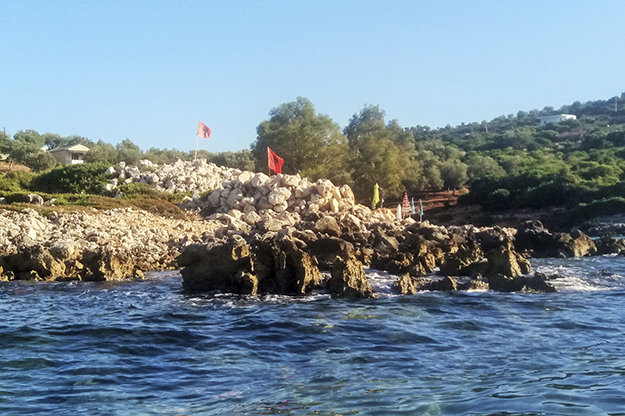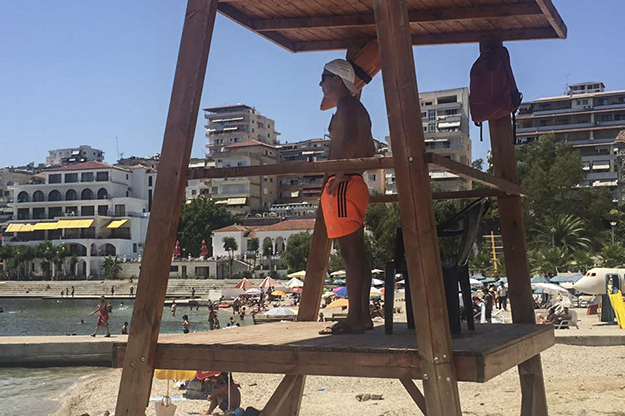Official data suggests that every year more and more foreign tourists are choosing Albania and its 300 km long coastline as a holiday destination. However, stories about beautiful beaches and hospitable people, are being overshadowed by safety concerns after seven people died in the sea during one tragic week at the end of July this year.
These incidents have led to a large debate in Albania, mostly on social media, about the need to have more information for tourists on its beaches, and questions over the lack of lifeguards across the coast.
So far, reaction from officials has been muted, and any clear cut steps being taken to make holidaying in Albania safer have not been given a high profile.
A tragic week at the seaside
From July 15-21, Albanian and social media were covered with distressing stories of a series of incidents at the beach with many wondering if they could have been prevented if lifeguards had been present. To add to the tragedy, almost all of the people who drowned were young.
On July 15, three people drowned at Zvernec Beach, near the southern town of Vlora. Two Albanian women, cousins, one 25 and the other 27 years old, faced difficulties while swimming because of choppy waters. As they shouted for help, Benjamin Ferhati (24), from Tetovo in Macedonia, tried to save them.
It is believed that he rescued the 25-year-old and brought her to the beach before returning to the sea to assist the other swimmer, who continued calling for help. Neither her nor Ferhati made it back to shore, while the first woman died later.
Sadly, it was not the end of tragic events that day. Nearby to the first incident, a couple of hours later, a 14-year-old boy from Albania was rescued from the sea and taken to hospital, but was unable to be resuscitated.

This summer, the Albanian coastline has been the scene of many tragic losses of life. Photo: Merxhan Daci.
The tragic week continued. Five days after the first tragedy, a 35-year-old man from Kosovo lost his life near the beach of Velipoja, on the north-western seashore. According to the police, the man entered the water to save his wife as she was in danger, but perished in his rescue attempt, while the woman survived.
A day later, a 15-year-old girl from Russia drowned at the beach in Ksamil. She went swimming with her mom, but the two became separated. The teenager’s body was found later by a beach cleaner. It is believed that she was hit by a boat, but the cause of death is yet to be confirmed. Nevertheless, after the tragedy occurred, a local in Ksamil was arrested on suspicion of hitting the girl with his boat.
Later, on July 21, a 66-year-old Slovak tourist lost his life at Golem Beach in Durres. According to Police, he had been swimming when he had a heart attack, and he was unable to make it back to the shore.
Authorities remain silent
According to the existing Law on Tourism, introduced in 2015, any person or company who uses the beach for enterprise, must have a contract with the competent public authorities (in this case the local municipality) and must fulfil conditions set by the Council of Ministers. In 2016, the Council of Ministers set rules confirming that lifeguards are a legal obligation in Albania, as are watchtowers, which should be installed every 200-250 meters on every beach.
The rules also state that the watchtowers should have a lifeguard that is qualified and trained “to save lives and able to give first aid.” The guard should be employed by the administrators of the beach, meaning either the municipalities in the case of public beaches, or any businesses that are using the beach, such as restaurants or bars. Lifeguards must be present throughout the tourist season, which lasts until September 30.
The two main national institutions that should be responsible for this area are the National Coastal Agency and the Ministry of Economic Development, Tourism, Trade and Entrepreneurship, who both have competencies over the management of the coast.
Over the last couple of weeks, K2.0 tried to reach officials at the National Coastal Agency, but in their email reply, the organization advised that it was the Ministry who should be contacted. The Ministry failed to reply to K2.0’s inquiries.
However, speaking to local media, Auron Tare, the head of National Coastal Agency, said that the institution he leads only managed the coast for a year, before going on to state that local municipalities have requested to manage their coast themselves. “Municipalities have insisted on managing the coastline and the Ministry has agreed,” Tare revealed. “Questions over safety at the beach should be raised with the municipalities.”
K2.0 tried to contact the municipalities where these incidents happened, but received no reply.
Missing lifeguards
In 2014, the National Coastal Agency made an agreement with the Montenegrin government for 41 students to be trained that year, and certified as lifeguards. The year after, these newly trained lifeguards were visible all over Albania, before disappearing.
A few hours after the three deaths in Zvernec, Tare reminded the public of this project through a local TV channel, stating that the first year after the training, the lifeguards were in the field, but then the responsibility for their employment was transferred from the Agency to local municipalities and the beach administrators, at which point they disappeared.
“We trained Albanian students at the Academy of Sports in Montenegro. We certified them to EU standards, sent them out into the field and there were concrete results. Many beach-goers lives were saved,” Tare stated. “It is the duty of the municipalities to refuse permission to people or businesses who don’t obey the criteria and standards. Security at the beach is the most important point.”

While Saranda has a contract in place to ensure lifeguards are present on its public beach, other beaches in Saranda and in many other coastal municipalities seem to have failed to provide the service. Photo: Municipality of Saranda.
Nikolin Mane, a representative from “Lifeguard Albania,” a private certified center for lifeguard training that has been functional since 2007, told K2.0 that they have working contracts with some municipalities across the coast, including for the public beach in Saranda.
“The government needs us,” Mane said. “The Ministry has called us several times because there have been many drownings recently. They haven’t been able to oversee this problematic situation. We have tried to cover the coast with professional lifeguards, and there is no other center (public or private) which can do the same job.”
Mane told K2.0 that lifeguards work for almost symbolic compensation, paid by the municipalities in the rare instances they are hired. “Their salaries are ridiculous,” he said. “This year our lifeguards are being paid 30,000 lek, or approximately 230 euros per month.”
Rama’s remorse and temporary solutions
Prime Minister Edi Rama has also spoken about the incidents on his Facebook profile, engaging in conversation with people who asked him questions about safety at the Albanian coast. In one of his answers he wrote that his government hold no responsibility for the absence of lifeguards, as the beach at Vlora, according to him, was considered to be “wild” rather than an “ordinary” beach.
“The part of the Vlora seaside where the unfortunate incident with the small boy happened is not in use by the municipality as a public beach, nor did the municipality give it to private companies,” Rama wrote, adding that there is a construction site close to this beach.
“The beach where the triple accident occurred is also a wild beach, which does not feature on the list of beaches approved by the Ministry, and, as a result, like in any other country in the world, when unfortunately such tragedies happen, there is no obligation to have lifeguards,” he concluded.

